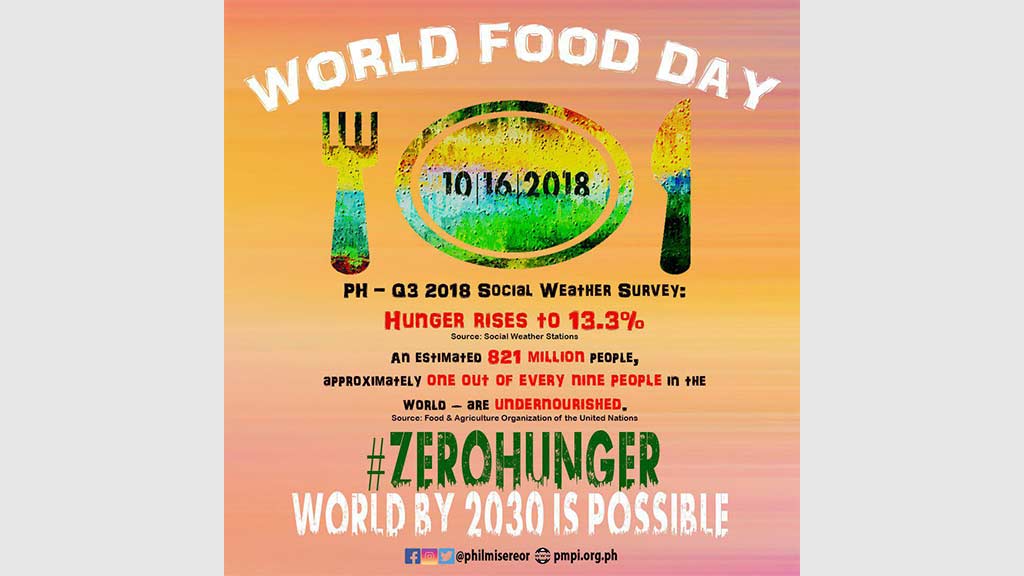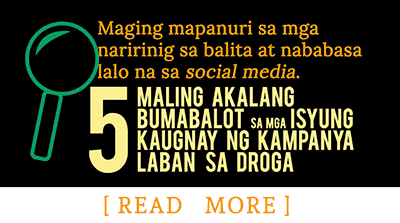Our Actions are our Future. This year’s theme of the World Food Day Celebration couldn’t articulate more the significance and urgency of the need to address the increasing magnitude of poverty and hunger worldwide.
We, from the Philippine Misereor Partnership, Inc., a network of civil society organizations, rights groups, peace and faith-based institutions hope that the 2018 World Food Day celebration manifest the very essence of it, particularly to effect change to the lives of Filipino people living in extreme poverty and hunger.
Our country is an agricultural country and as ironic as it gets, the people who are providing us food, our farmers and fisherfolks are among the poorest of the poor according to Philippine Statistics Authority (PSA). PSA record shows that these sectors have the highest poverty incidence in 2015 at 34.3 percent and 34 percent, respectively.
The survey conducted by Social Weather Stations (SWS) from September 15-23, 2018 revealed that 13.3% or an estimated 3.1 million families experienced involuntary hunger at least once in the past three months. While 821 million people or one in nine of the world’s population faced food shortage in 2017 according to a UN report.
These numbers are alarming and warrant urgent and strategic actions. However, our government either put aside the issue or address it in depraved way.
In the Philippines, farmers have been struggling to keep their livelihoods afloat because of debts they cannot repay for seeds and chemical inputs owned by business companies. This is on top of the concerns on the impact of climate change to agriculture, the emergence of genetically modified organisms (GMO) that threatens the very ecosystem, the lack of new farmer practitioners and thus further threatening food security. Likewise, the enactment of Tax Reform for Acceleration and Inclusion Act (TRAIN) exacerbates the condition of the lives of people especially those who are living in below poverty line.
Living a dignified life means having access to food, including the other basic needs like shelter and clothing. Unfortunately, not all people enjoy this opportunity thus, some poor people struggle more just to survive by collecting and eating leftover food. The food waste produced globally is so staggering that each year, 1.6 billion tons of food worth about $1.2 trillion are lost or go to waste, one-third of the total amount of food produced globally.
On this celebration of World Food Day, we highlight our grave concern on the emergence of GMOs. PMPI strongly opposes the looming field trials of golden rice in Muñoz, Nueva Ecija and San Mateo, Isabela. Golden rice variety poses a threat to environment, public health, and farmers’ livelihood. It is just another scheme by the agrochemical transnational corporations (TNCs) to control the sector of food and agriculture, which would later on making the farmers dependent on their patented genetically modified seeds and expensive chemical inputs.
We also want to highlight the threat on food security brought by large-scale, destructive mining. Below are some of the experiences of PMPI’s Sites-Of-Struggle (SOS)* Communities, incidentally, are also food producing areas, namely:
1. Boac River used to be a source of livelihood and recreation for many Marinduquenos, fell victim to Marcopper Mining Corporation’s misdeed when its mine tailings pond – formerly an open-pit mine with tunnels to bring in water was used as tailings pond – slowly gave way to the pressure of poisonous mine leakages, then Marcopper mine spill into the river that caused fish kills and biological death of the river on March 24, 1996. Meanwhile, the affected communities led by Marinduque Council for Environmental Concerns (MACEC), have yet to receive justice, and reparations for environmental and health damages by caused the spillage.
2. In October of 2005, the mining project Lafeyatte Philippines Inc. in Rapu-rapu Island, Albay caused a two incidents of cyanide spill that killed massive amounts fish around the coastal areas of Sorsogon and Albay, affecting the livelihood of small-scale artisanal fisherfolks. Until today, the Island has yet to impress signs of rehabilitation as the open-pit mine lay bare. The mining project was the first mining operation allowed under the Mining Act of 1995 and envisioned as would-be model of sustainable and responsible mining (Rappler, March 2018).
3. Indigenous Peoples of Kibungan, Benguet – engaged in vegetable farming and a major vegetable supplier of Metro Manila faced threats in the past from mining as the Mines and Geosciences Bureau of DENR allowed a mining exploration project in area without proper FPIC considering that Kibungan is an Ancestral Domain with a Certificate of Domain Title (CADT).
4. Potentially, among the world’s largest gold-copper open pit mines, the Tampakan Mining Project has a mine site covering about 10,000 hectares and will affect the Marbel Watershed – a water source for agricultural lands of Koronadal City and Tantangan for South Cotabato, but also to the farming communities of Maguindanao, Sultan Kudarat, and North Cotabato, and fishing for Lake Buluan, Rio Grande de Mindanao up to the Moro Gulf. Furthermore, the mining permit (called FTAA/Financial or Technical Assistance Agreement) largely covers the ancestral domain of the B’laans whose lives are threatened, and culture destroyed. Its projected environmental impact according to BankTrack, will affect 935 hectares including old growth Rainforest, and produce waste rock of 2.6 Billion tons of 300 meters high and area coverage of 500 hectares.
If we hope to end the global crisis of starvation and aim for #zerohunger by 2030, government action to protect the ecosystem that is providing us food and support to farmers to sustain production is urgently warranted. People are also called for drastic change of lifestyle so that World Food Day is really worth celebrating.

